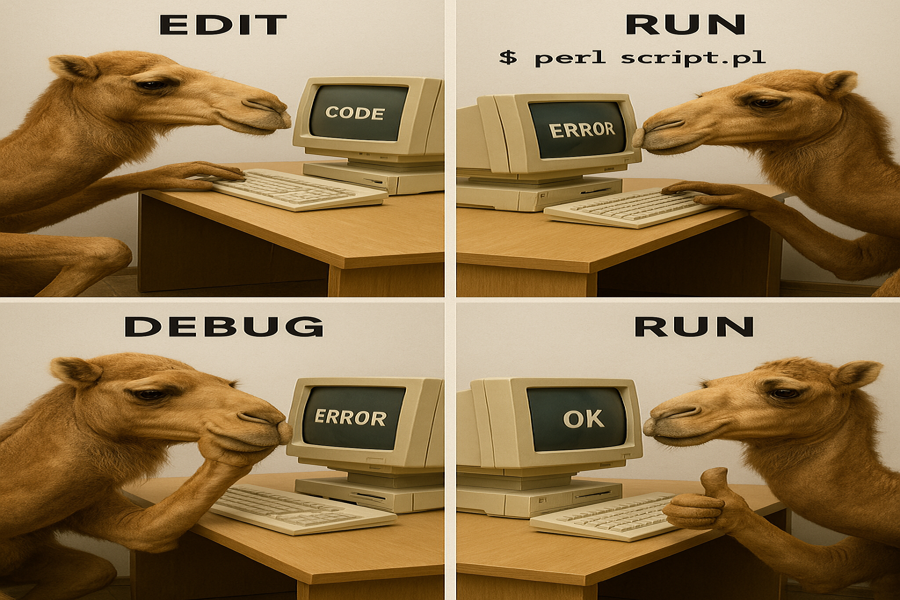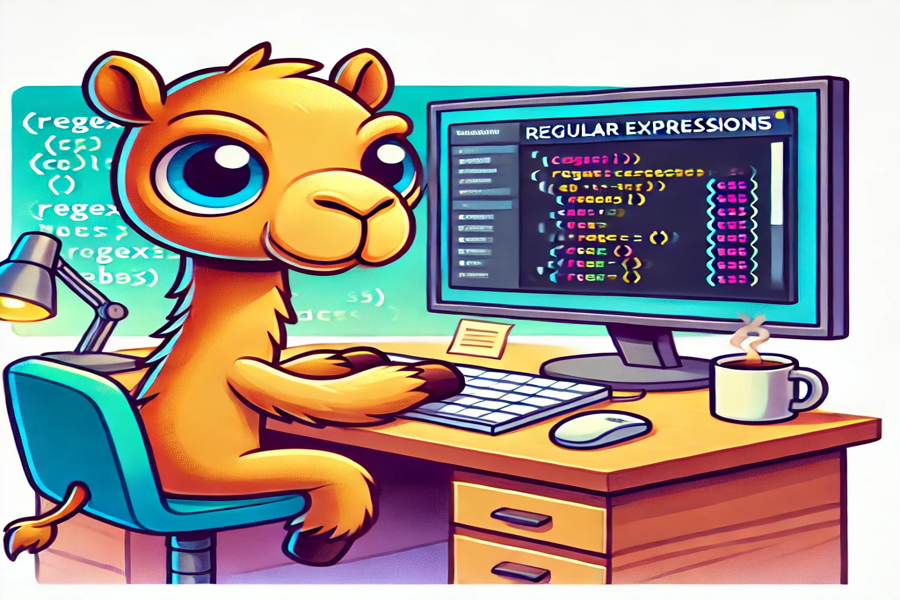Welcome to Perl

An introduction to newbie in Perl.
Please checkout the post for more information:
https://theweeklychallenge.org/blog/welcome-to-perl

An introduction to newbie in Perl.
Please checkout the post for more information:
https://theweeklychallenge.org/blog/welcome-to-perl
Lots has been going on. All of us showed up, though Aristotle had to join late and Philippe had to leave early, so the meeting was short but productive:
Years ago I wrote about a concise fork idiom. It turns out that it’s possible to do better than everything I discussed in that entry as well as the proposals in the comments.
I didn’t at the time appreciate a clever aspect of variable scoping in Perl:
use strict;
sub get_answer { 0 }
if ( my $answer = get_answer ) {
...;
} else {
print $answer;
}
App::ModuleBuildTiny is a relatively new authoring tool. It aims to be a relatively lightweight (at least to some other tools like Dist::Zilla) and newbie friendly tool. It supports two install tools: Module::Build::Tiny (obviously what it was originally designed for) and Dist::Build; it does not support ExtUtils::MakeMaker or Module::Build.

Handling of undef / false default values in Perl v5.38
Please checkout the post for more information:
https://theweeklychallenge.org/blog/subroutine-signatures
All three of us attended, but none of us had the time for significant discussion, so we decided to reclaim the time and make some progress on our various to-do list items.
(apologies for "promoting"(?) Perl obfuscation...)
Today I won a gift card at an in-office meeting with the following code. Challenge: print the numbers 1-100 in the most incomprehensible, inefficient way. My entry, edited for brevity:
#!/usr/bin/env perl
use v5.16;
splice @_, @_, -1, ++$_;
splice @_, @_, -1, ++$_;
splice @_, @_, -1, ++$_;
splice @_, @_, -1, ++$_;
splice @_, @_, -1, ++$_;
# plus 95 more of this
say join $/, @_;
Thinking about it more this evening, I came up with
$SIG {__DIE__} = sub { $_ = (pop)+0; chomp; $_%6?say:exit};
{ select undef,undef,undef,1; eval { die time-$^T }; redo; }
(where 6 instead of 101 so I don't have to wait 100 seconds (and to be honest I'm not sure if there'll be rounding errors)).
Wonder if any obfuscators could come up with better (the less inefficient, incomprehensible the better).
I wrote very elliptically about this warning and received some helpful comments with the standard advice about how to proceed when encountering it. Except unfortunately that advice will be of no use when you encounter this warning.
Namely I should have been less cute about it and made it clear that I was specifically talking about a warning about a wide character “in substitution”. How can a s/// even possibly trigger a wide character warning, you ask? Beats me, to be entirely honest, even now, but: if you have a use locale somewhere, it turns out that it can. Because defeating that is what fixed the warning I was getting:

Environment variable PERL_RAND_SEED in Perl v5.38
Please checkout the post for more information:
https://theweeklychallenge.org/blog/random-in-perl
Control. That’s what we all desire and very rarely acquire. The natural restlessness that occurs when you watch one of your offspring flicking from one movie title to the next, barely glancing at the summary before rejecting it, is one of the reasons I don’t like family movie night. My daughter’s grip on the remote is as strong as her decision making skills are weak; I struggle silently to hold back any outburst that would expose my failing parenting abilities once again. I have to distract myself with thoughts of the good old days when the TV had only 4 channels and Teletext was the closest thing to internet. Desiring such regression is now getting much of a habit for me. But we change what we can, accept what we can’t and trust, often foolishly, that those blessed with control do the best for all of us. Ah, look. Another teen fantasy horror romance movie. Thanks a heap, Netflix.
All three of us attended. Other than administrivia we talked about formally documenting our supported platforms, and we intend to start a discussion on the mailing list about this soon. This is also a topic for the upcoming Perl Toolchain Summit.

Special variable ${^LAST_SUCCESSFUL_PATTERN} in Perl v5.38
Please checkout for more information in the post below:
https://theweeklychallenge.org/blog/perl-regex
In the last months of the previous century, I had to learn Perl to be able to teach it to professionals. It was my 28th language to use, but still took two years to understand deeply. As experienced assembler and C programmer, I was astound how much more of my ideas I could achieve with this new Swiss army knife in my hands. I fell in love with Perl.
Of course, the only way to learn a programming language well, is to use it for a larger project. So, I started to re-code the business shell scripts and websites to Perl. Part of it was sending automated emails to colleagues.
Your phase in life is probably different, but for my personal feeling it was not too long ago; for Internet's lifespan, the year 2000 is ancient history. The first spec for MIME headers in email were just 8 years old at the time, and many email features were still evolving.
Die Hochschule der Bayerischen Wirtschaft unterstützt den Perl Workshop 2025 in München.
Wir freuen uns über die Unterstützung durch die HDBW!
Von der bayerischen Wirtschaft, mit der bayerischen Wirtschaft, für die
bayerische Wirtschaft: Die Hochschule der Bayerischen Wirtschaft (HDBW) ist
eine private, staatlich anerkannte Hochschule für angewandte
Wissenschaften - mit Fokus auf Wirtschaft, Technik und Digitalisierung. An der 2012 gegründeten HDBW mit Sitz in
München-Riem studieren derzeit knapp 500 Studierende.
This announcement comes a bit late in the year, but the preparations for the next Perl Toolchain Summit have been going on for several months now. Today I am proud to announce that the 15th Perl Toolchain Summit will be held in Leipzig, Germany, from Thursday May 1st till Sunday May 4th, 2025.
This post is brought to you by Deriv, a Gold Sponsor of the Perl Toolchain Summit 2024.
For 25 years, Deriv has been committed to making online trading accessible to anyone, anywhere. Trusted by over 2.5 million traders worldwide, the company offers an expansive range of trade types and boasts over 200 assets across popular markets on its award-winning, intuitive trading platforms. With a workforce of more than 1,400 people globally, Deriv has cultivated an environment that celebrates achievements, encourages professional growth, and fosters talent development which reflects in its Platinum accreditation by Investors in People.

Please find my learning experience in the post below:
https://theweeklychallenge.org/blog/terraform-docker
All three were present.
any/all), prompted by the Mojolicious::Lite DSL question. We went over its status, how the work got merged, and current issues with the design. We confirmed an already possible technical solution to the Mojolicious issue and agreed that it satisfies us for now, but we still intend to pick up the further issues at a later time.Cellgraph 0.7 is out. (I introduced it here and there.) And I will tell you about the great new features in the next paragraph and how it helps you to play with logical structures and deepen your understanding of them. But first please let me mention the why!

Originally published at dev.to
In a previous blog post, I explored the modern way to write CGI scripts using frameworks like Mojolicious. But as pointed out in comments, despite the many benefits, there is one critical problem: when you actually need to deploy to a regular CGI server, where the scripts will be loaded each time and not persisted, frameworks designed for persistent applications add lots of overhead to each request.
CGI scripts have historically been written using the CGI module (or even more ancient libraries). But this module is bulky, crufty, and has serious design issues that led to it being removed from Perl core.
blogs.perl.org is a common blogging platform for the Perl community. Written in Perl with a graphic design donated by Six Apart, Ltd.